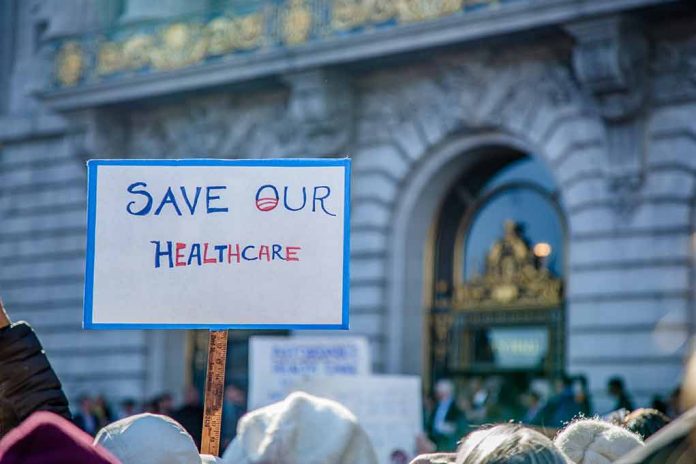
A federal court in North Dakota has temporarily halted the expansion of Affordable Care Act (ACA) coverage to “Dreamers” in 19 states, marking a significant setback for the Biden administration’s healthcare initiatives.
At a Glance
- U.S. District Judge Daniel M. Traynor blocked ACA coverage for DACA recipients in 19 states
- The ruling prevents the federal government from enforcing a Biden administration rule allowing Dreamers access to the ACA marketplace
- Judge Traynor stated that CMS lacks authority to redefine “lawfully present” status
- The decision affects an estimated 100,000 uninsured DACA recipients
- Kansas Attorney General Kris Kobach praised the ruling as upholding the rule of law
Court Ruling Halts ACA Expansion for DACA Recipients
In a significant legal development, U.S. District Judge Daniel M. Traynor has granted a preliminary injunction to Kansas and 18 other states, effectively blocking the Biden administration’s attempt to extend Affordable Care Act (ACA) coverage to recipients of Deferred Action for Childhood Arrivals (DACA). This ruling prevents the federal government from enforcing a rule that would have allowed some Dreamers access to the ACA marketplace in these states.
The decision comes in response to a lawsuit filed by 19 states against the federal government’s rule to expand ACA benefits to DACA recipients. The Biden administration had announced this rule in May, aiming to allow DACA recipients to enroll in ACA health plans and receive financial assistance. However, Judge Traynor’s ruling has put this initiative on hold, at least temporarily.
Federal judge temporarily blocks Dreamers from accessing Obamacare https://t.co/ovMVfRFMuU
— Just the News (@JustTheNews) December 10, 2024
Legal Basis and Implications
At the heart of Judge Traynor’s decision is the question of who has the authority to define “lawfully present” status. The court found that the Centers for Medicare and Medicaid Services (CMS) overstepped its bounds in attempting to redefine this term to include DACA recipients.
“The authority granted to CMS by the ACA is to ascertain whether an individual meets the requirements for lawful status. It by no means allows the agency to circumvent congressional authority and redefine the term ‘lawfully present,'” Judge Traynor stated in his ruling.
This ruling underscores the ongoing legal challenges surrounding the DACA program and the extent of executive authority in interpreting and implementing immigration-related policies. The decision affects an estimated 100,000 uninsured DACA recipients who would have been eligible for coverage under the proposed rule.
Reactions and Next Steps
Kansas Attorney General Kris Kobach, who successfully argued the case, hailed the decision as a victory for the rule of law. His statement reflected the sentiment of those who oppose extending federal benefits to individuals not legally defined as present in the United States. “This decision is a big win for the rule of law. Congress never intended that illegal aliens should receive Obamacare benefits. Indeed, two laws prohibit them from receiving such benefits. The Biden administration tried to break those laws. But we fought back and defeated the Biden Justice Department.”
On the other hand, the Biden administration and supporters of the rule argue that extending healthcare coverage to DACA recipients is both a moral imperative and a public health benefit. A CMS spokesperson stated that the agency is reviewing the court’s decision but declined to comment further on the ongoing litigation.
Broader Context and Future Implications
This ruling is part of a larger, ongoing debate about the rights and benefits afforded to DACA recipients. The DACA program, initiated by President Obama, protects certain individuals who entered the U.S. illegally as children from deportation and allows them to work legally. However, it does not grant eligibility for government-subsidized health insurance.
The 19 states that brought the lawsuit argued that expanding ACA coverage to DACA recipients would impose additional administrative and resource burdens on their healthcare systems. This highlights the complex interplay between federal immigration policies and state-level healthcare administration.
As the legal battle continues, the future of healthcare access for DACA recipients remains uncertain. The Department of Justice has not yet commented on whether it will appeal the decision. Meanwhile, advocacy groups and healthcare providers are left to grapple with the implications of this ruling on the health and well-being of the affected DACA population.
Sources:
Federal court blocks ACA coverage for Dreamers
Court Temporarily Blocks Obamacare Coverage to Dreamers in 19 States














